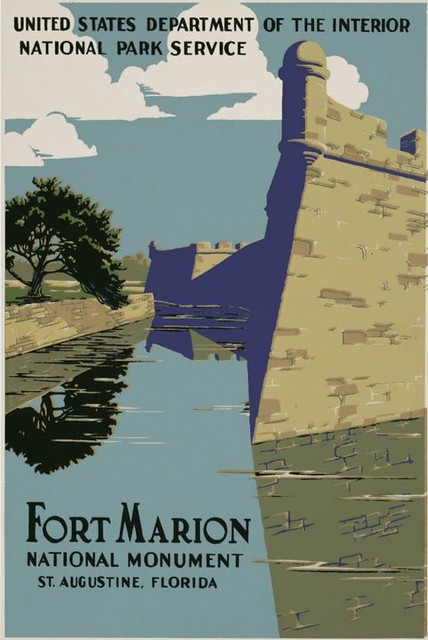
WPA Fort Marion (Now Castillo de San Marcos) National Monument poster, St. Augustine, Florida.
Castillo de San Marcos (Wikipedia)
The Castillo de San Marcos is the oldest masonry fort in the continental United States (Castillo San Felipe del Morro in San Juan, Puerto Rico is older). Located on the western shore of Matanzas Bay in the city of St. Augustine, Florida, the fort was designed by the Spanish engineer Ignacio Daza.[1][2] Construction began in 1672,[3] 107 years after the city’s founding by Spanish Admiral and conquistador Pedro Menéndez de Avilés, when Florida was part of the Spanish Empire. The fort’s construction was ordered by Governor Francisco de la Guerra y de la Vega after the destructive raid of the English privateer Robert Searles.[4][5] Work proceeded under the administration of Guerra’s successor, Manuel de Cendoya in 1671,[6] although the first stone was not laid until 1672.[7]
After Britain gained control of Florida in 1763 pursuant to the Treaty of Paris, St. Augustine became the capital of British East Florida, and the fort was renamed Fort St. Mark[8] until the Peace of Paris (1783) when Florida was transferred back to Spain. In 1819 Spain signed the Adams–Onís Treaty which ceded Florida to the United States in 1821; consequently the fort was designated a United States Army base and renamed Fort Marion, in honor of American Revolutionary War hero Francis Marion. In 1942 the original name Castillo de San Marcos, was restored by an Act of Congress. The fort was declared a National Monument in 1924, and after 251 years of continuous military possession, was deactivated in 1933. The 20.48-acre (8.29 ha) site was then turned over to the United States National Park Service.

